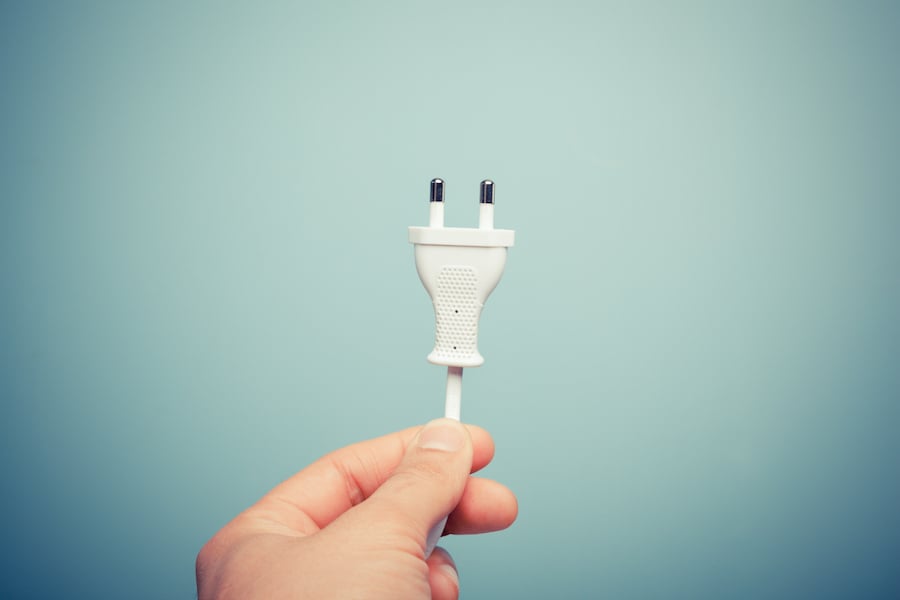Looking for blogging tips to give yourself the best shot at creating a successful blog?
As a newbie blogger, you want to avoid becoming overwhelmed.
Being overwhelmed can mean the difference between a good blog that exists only in your mind and a blog full of great content that you can look at proudly, thinking, “I created this.”
For that reason, instead of a bazillion hacks and strategies, we’re going to focus on 12 easy-to-follow, high-quality blogging tips.
Ready?
Let’s get started!
1. Pick a Niche at the Intersection of Love and Money
To become a successful blogger, stack the odds in your favor by choosing a popular niche that you love to write about — one with both healthy competition and a clear path to monetization.
You may have a hard time committing to one path, especially if you’re interested in multiple niches or topics.
Here are some questions to narrow the field.
- Is it a topic with plenty of organic search traffic? You want to be unique in the content you create, not in the topic you write about. So first, confirm that the niche has plenty of interested readers. Otherwise, you can forget about monetizing your blog down the road.
- Is there competition? Look for existing blogs and influencers on your topic, which indicates a viable market. Competition is a good thing since it points the way to a popular, thriving space.
- Is this a topic you enjoy? Imagine yourself on a chilly winter day, with an entire day of free time, snuggled up on the couch with a book. What’s the topic of that book? If it matches the subject of your blog, excellent sign. Choose a topic you can spend your days writing blog posts about for at least 3 years.
- Do you have work or life experience related to your niche? Love to explore the world? A travel blog could be fun. Are you an expert on social networks like LinkedIn or Reddit? Do you have a background in digital marketing that could give you an edge?
- Is there a way of earning money with your topic? How are other blogs in this space earning money? Blogging is hard work, so make sure there is a path to monetize your blog before you begin.
2. Understand Your Audience

The success of your content depends on how well you understand your audience.
When you understand your audience, you can create a strong connection with them. Use the language they use, showing that you’re an insider and that you get them.
Quality content that resonates with your audience and keeps them on your site is the cornerstone of any savvy content strategy.
After all, if you don’t understand readers’ wants and needs, your piece of content may not be useful or relevant to them. They’ll bounce to the next blog.
First, determine who your target readers are. Then research them. What blogs do they read? What podcasts do they listen to? Get to know their challenges or their goals and how your content can help solve their problems.
Empathy is critical here, and one of the best ways to gain insight is to be a member of your audience!
3. Pick the Right Blogging Platform

What is the “right” blogging platform to use? It depends. Are you blogging for fun? As a hobby? Are you testing it out to see if this blogging thing will stick? Then look for free options.
One of the best free options is to create an account on Medium.com. It’s not only free, but it’s also super simple. And with more than 60 million unique monthly readers, there’s no need to drive traffic! So, start here first.
If you really want a website, WordPress.com has a free plan. But understand that it’s like squatting on a friend’s couch versus owning your own home.
If you plan to blog as a business, then you’ll want a self-hosted website using WordPress.org. This will cost money, but your new blog will look far more professional.
Plus, you don’t want to depend on a free platform that could kick you off at any time or that dictates what you can or can’t do. No, once you get serious, you’ll want that self-hosted site. SiteGround (affiliate link) is the web host we recommend most often to our students. To learn more about it, check out our in-depth SiteGround review.
Once you get your WordPress blog set up, you’ll need to choose a theme. Your WordPress themes will only determine your blog design, but can also affect your site’s loading speed, so choose carefully. The Elementor (affiliate link) website builder works with a variety of themes and creates beautiful pages in minutes. Read Smart Blogger’s full Elementor review here.
The good news is that there are some great choices for free WordPress themes.
4. Less is More: Choose Smart Plugins

WordPress is powerful, but it can’t possibly include every feature everyone wants. Nor would you want it to — that would make the software bloated and buggy, which is nerd talk for slow and unreliable.
Instead, when you want additional functionality in WordPress, plugins can serve your needs.
Plugins are pieces of software code that you can add to your WordPress site. Many are free for basic levels of service, with premium add-ons available. Just know that they can slow down your site, so don’t use them unless they serve a clear purpose.
Each WordPress plugin you choose needs to play nicely with your theme and other plugins you’ve installed. And you’ll want to make sure the plugin is updated regularly — a sign that developers still care about it.
The safest path is to stick with well-known plugins that get high ratings from other WordPress users.
Some categories of useful or smart plugins:
- Performance optimization plugins can decrease page load times. Your web hosting company may provide one for you.
- SEO assistant plugins such as Yoast SEO help with basic on-page SEO or search engine optimization (don’t worry, we’ll cover this later).
- Automatic backup plugins create copies of your blog and upload them to Google Drive or other online storage services like UpdraftPlus, for example.
5. Headlines Are Critical

It’s a noisy world out there.
You could labor for hours over a post filled with carefully researched, valuable information. But if no one reads it, nothing happens. That means no organic traffic, no page views, no email subscribers, and no lives changed.
As a blogger, one of the first skills you need to develop is writing catchy headlines. Ones that wave and call out to your target readers, saying, “Hey! Look, I wrote this for you, and here’s how you’ll benefit!”
Headlines should be specific — that way, your target reader knows exactly who your post is for, and what it’s about.
Brainstorm as many headlines as possible. Many times, the first ones you come up with are “meh.” But if you keep going, you’ll write one that makes you smile with satisfaction.
6. Write Valuable Content, Optimized for Online Readers

Writing for online readers means delivering value in an easy-to-absorb format.
Here are some primary rules:
- Write in a conversational tone, like you’re talking to a friend. Avoid being formal. Contractions are welcome here.
- Make your post easy to read. That means:
- Use subheads to help scanners. People will skim your post to see if it’s worth reading before committing their time and energy.
- Avoid walls of text. Write in short, punchy paragraphs.
- Avoid rambling. Stick to one central idea and make your post only as long as it needs to be to get that idea across.
- Add in screenshots and other images where appropriate to give your reader a break from text.
Using data and references to back up your claims wherever possible adds value, making your arguments more concrete.
Including well-placed power words will energize your blog content. And providing examples will bring life to your writing, offering real-world scenarios for otherwise vague concepts. They make concepts easier to understand and can even show readers what is possible in their lives.
7. Edit First, Publish Later

We’ve all seen it. The post someone wrote but neglected to edit.
After the third or so careless spelling error, you decided that if this writer couldn’t bother to take the time to edit, why should you take the time to read it?
Please — don’t be that writer. We want you to become a successful blogger.
After you create your new content, let it sit a day or two. Then come back and take the muzzle off your inner editor.
Edit before you publish!
As you progress along in your writing career and become a seasoned blogger, keep a list of the mistakes that haunt you. For example, sometimes, my corporate background creeps into my writing. Between the overuse of the passive voice and the formal, stilted language, heck, I can bore myself reading some of my rough drafts.
Create a checklist. Don’t try to remember everything.
Also, use a basic grammar checker. Both Google Docs and Microsoft Word have built-in free tools for checking spelling and grammar. No excuses!
If you want more help with grammar, there are plenty of user-friendly software options at various price points. Grammar checkers aren’t perfect, and nothing beats a human editor. Still, they can be cost-effective ways of weeding out the most obvious errors.
8. Consistency Is Key

Let’s be honest. You chose blogging because you love to write, but we all experience those days where writing is the last thing we want to do.
Writing can be tough at times.
A day or two off is not a big deal, but it puts you at the risk of losing momentum. Days become weeks, which then turn into months.
To prevent this, don’t write only when you feel like it. Write on a schedule. Be consistent.
As a new blogger, you have a decision to make: How often are you going to create new posts? Weekly? Monthly?
Decide on how often you’ll post and stick to that decision. Readers need that consistency.
9. Gather Your Internet Tribe. Build Your Email List.

Experienced bloggers all seem to say the same thing: Don’t wait to start your email list.
Yes, it’s intimidating, but the odds are that most of your website visitors are one-time only and could be lost forever.
Don’t forget that with social media, you don’t own a list of your followers there. Everything you build on a platform could be wiped out overnight.
Fortunately, no one can take away your email list.
After selecting an email marketing service, you’ll want to create an incentive that entices readers to become subscribers. Think of the types of offers that get you to submit your email address.
The incentive must offer value, not just to an audience, but to your audience.
Place pop-ups and landing pages with opt-ins offering those sweet incentives in multiple places on your blog to make it easy for readers to subscribe.
Then once you have a list, interact with your readers to create a bond. Ask them questions and request feedback. This will give you information to create even better content that resonates more strongly with your audience.
If you want to build a personal brand, monetize your blog, and work towards making a full-time income from it, the first step is to get that email list started!
10. Learn the ABCs of SEO (Search Engine Optimization)

Want to be discovered online? You can earn free traffic from Google, but it comes at a price. That price is learning the basics of SEO and then implementing what you learn.
The first step is learning how to do keyword research. Keyword research is the process of figuring out which words or phrases people use to search for information on your topic.
Showing up in Google searches requires plenty of high-quality backlinks pointing to your content from sites that Google sees as trustworthy authorities on your topic or within your blogging niche.
You also need to understand “searcher intent” or what someone is looking for when they type in those keyword phrases online. The trick is to make sure the content you create answers the questions searchers are asking.
An effective method is to type your topic keyword into the Google search box. Then look at the top results to see what content is ranking.
Another way to see what people are asking is to use AnswerThePublic. With this tool, you type in a topic name and get a list of questions people are asking about the topic.
11. Share Your Best On Social Media

Once you create valuable content designed for your target audience, the next step is to promote it on social media.
Always check the rules first.
For example, don’t join Facebook groups and throw in links to your website in your posts since that could get you banned from the group. Almost all groups have rules for self-promotion, so be careful to follow them.
Social media marketing is a huge topic. To keep things simple, pick just one social media platform to start with.
Try to choose the one where your target audience is most likely to be. Focus on it exclusively until you’re comfortable before you move on to the next platform.
Each social media platform has different purposes and attracts different audiences.
- Pinterest is an excellent platform for visually oriented blogs (Example: a home decorating blog). You create and post eye-catching images with links to your blog content.
- Twitter allows you to connect with others through (up to) 280-character tweets. You can join discussions and get your name out there.
- Facebook allows you to join or create groups — providing a sense of community. Just remember that they can and do change the rules at any time.
12. Think Long Term

Becoming a blogging success takes time.
And content creation is equal parts rewarding and challenging.
To last for the long haul, you want to have a passion for your topic. You need to enjoy reading and writing about it for its own sake, not for the money.
To stay motivated, think about how your content improves people’s lives.
Otherwise, you’ll quit too soon.
Make it fun. As a new blogger, now is your time to try things, to experiment. It’s your time to find your voice.
Maybe your own blog is a lonely ghost town right now, so posting for a more popular blog (with a relevant audience) may get you noticed. Try writing a series of guest posts, offering to create content for other blogs.
Yes, you’ll want to install Google Analytics, a data collection tool, as soon as you set up your blog. But don’t pay much attention to the numbers yet. That comes later.
As a newbie blogger, you have more important things to focus on, like the ones in the blogging milestone post below.
Let’s be honest. If this is your first time building a blog, you probably won’t be able to earn a full-time income upfront. You may not make any money blogging for a while. But if you keep at it, putting in the hard work, you stack the odds in your favor.
So, Which of These Blogging Tips Will You Do First?
Reading a list of blogging tips helps you understand what you need to do. But there’s a world of difference between reading about it and doing it.
So, make a plan. Start by finding your topic and audience.
Then methodically go through the tips on this list one by one.
Don’t think about all the tips at once. Remember, take one step at a time.
The more of these tips you implement, the stronger your site will become.
You’ll become a better blogger, writer, and content marketer.
But be patient and realize this won’t happen overnight. Give it the time and hard work it requires.
Above all else, enjoy your blogging journey!





This is an excellent rundown. I’ve been working on blogging for a year now and most of this I had to find out the long way…well done.
Great article Karen. Chock full of good advise and tons of valuable resources. Thanks Karen for sharing.
Jerry
Thank you, Jerry. I’m happy you enjoyed it and found it useful!
Thanks, Karen,
Sure blogging is profitable but takes time. These tips you have shared are amazing in helping grow your blog and profit from it.
Great article, I enjoyed every bit of it. Thank you so much.
Hi Karen,
Wow; I am deeply resonant with #1. I frame it a bit differently as I see it as following your passion to solve a problem as money follows. Money is in solving specific problems that need solving at scale. Observe Amazon or any titan of a business model. People struggled to find a convenient, easy way to get what you want thru the internet, quickly and easily, but in one spot; Amazon followed.
Do what you love doing to make the blogging work the pure reward. From there, you lay the foundation for a thriving blogging campaign but only if you solve a clear problem that needs solving. This is the way to set yourself up to generate blogging profits down the road.
Ryan
This post is helpful for those who is just starting their career as a writer.
What if I want to write an article but all potential keywords are highly competitive. In this case, is it not worth writing because nobody will see it anyway?
Hi Karen, great read. Just like you mentioned picking a niche at the intersection of love and money is highly critical. A few people only go for what they love and some only think about money, you have explained it very nicely why both of them are important. Also, the importance of building an email list from day one is often forgotten as well. Great points, I love it. Thanks for sharing. Cheers!
Hi Karen, excellent tips.
I do agree with you that we need to think long-term to succeed in blogging. Just like any other real business, it takes time to generate decent results from blogging.
Most people quit blogging within a few months because they look for shortcuts. There are no shortcuts. I’ve been blogging for more than a decade and my blog earns more than $10k/mo and I guarantee, you’ll succeed when you’re consistent.
Yes, you’ll see lots of ups and downs (especially in terms of Google freaky updates), but don’t give up. Instead, set small and achievable goals that help you build momentum.
Thanks for the tips.
Thank you for this article.
Choosing the right niche should be the priority for a new blogger.
If you start writing on a niche that is not of your interest, you will surely stop blogging tomorrow.
Thank you once again,